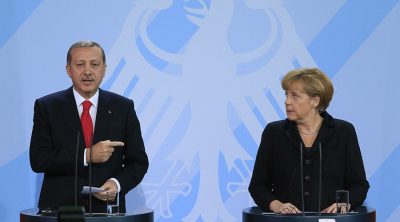Reuters photo
By
Tom Arms
Germany is in the throes of a bad taste debate. Actually it is a real live, honest to God freedom of speech row with potentially far-reaching international repercussions. But the spark that lit this bonfire was an extreme case of extremely bad taste.
Political satirist and television comedian Jan Böhmermann went onto Germany’s ZDF television to read a poem in which he satirised Turkish President Recep Tayyip Erdogan as a man who suppresses minorities, kicks Kurds, slaps Christians, watches child porn and occasionally has sex with goats.
It was all done in the worst possible taste. And it was quite funny. It also contained a boulder of truth, although not when Böhmermann referred to the child porn and goats.
The problem is that President Erdogan has nil sense of humour. Using a law that prohibits Turks from criticising their public officials, he has indicted 263 individuals for poking fun at him, including a former Miss Turkey and a 16-year-old boy.
Now he is trying to export Turkish censorship to Germany. Almost as soon as the 35-year-old Böhmermann went off air the Turkish embassy demanded that the comedian be prosecuted, and this week President Erdogan has lodged a libel complaint against him. The three million Turks working in Germany have also held protest demonstrations and Böhmermann has been forced to seek police protection.
Germany has its equivalent of America’s Freedom of Speech First Amendment. It is Article Five of the Basic Law which is the 1949 German constitution. Unfortunately for Böhmermann there is an older law—Paragraph 103 of the 1871 German Criminal Code which has never been repealed to bring it in line with the constitution. This law makes it a criminal offense to insult another head of state.
The situation is further complicated by Turkey’s key role in stuffing a cork in the refugee crisis that threatens to tear the EU apart. Despite objections from the UN and human rights groups, the EU has struck a deal with the devilish President Erdogan for him to take back any refugees crossing the Aegean and keep half of them. German officials are seriously concerned that the Turkish strongman is not above reneging on the refugee deal if he doesn’t get his way in the bad taste row.
The diplomatic row between Turkey and Germany highlights an additional problem in how – in the digital age of collapsing information borders – to square the developed West’s free speech laws with the censorship of dictators paranoid that the slightest criticism will topple them from power.
Turkey is only one example. There are scores of others. According to The Economist, the Chinese employ 100,000 people to maintain what has become known as the Great Firewall of China. Russia enjoyed a free speech spring in the aftermath of the collapse of the Soviet Union. But Vladimir Putin has clawed back control to near Stalinist levels. The Arab news channel Al Jazeera is often cited as an example a bastion of free speech in the Arab world. The TV channel is owned by the Qatari royal family and is quick to garner garlands for its critical reporting of the Arab world—except anything to do with Qatar.
What is perhaps not recognised enough is that free speech is more than a political right. It is also a positive good that has been a major factor in the development of the West. The perpetual questioning of philosophers such as Socrates and Plato did more than stimulate political debate. It laid the foundations for advances in medicine, technology and science. There is a reason why out of the world’s top ten universities, nine of them are located in the free speech bastions of the United States and Britain.
Free speech is good for a laugh. It is also good for the advancement of human knowledge. Censorship helps keep politicians in power and insures that their countries remain at the bottom of the social and economic heap.
Tom Arms broadcasts on world affairs for a number of US radio stations including WTKF at http://www.wtkf107.com/. His Weekly Viewpoints discussion programme can be heard at 1830 EST on Wednesdays and his LookAhead at the next week’s main events on Fridays at 1800.
LookAhead Radio World Report for week commencing 18th April:




No Comments Yet!
You can be first to comment this post!